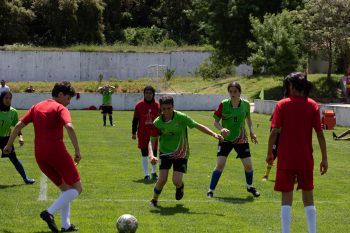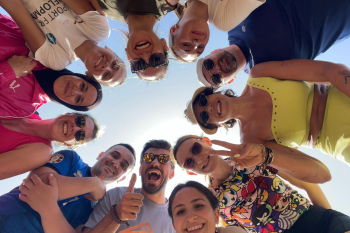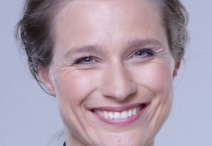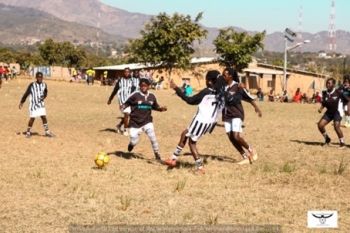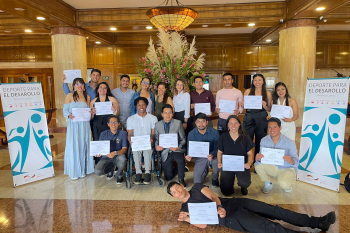
Youth Ambassadors in Latin America
Looking back at the past years of the Sport for Development (S4D) programme, one of the most inspiring journeys in Latin America has been that of the Youth Ambassadors of Sport. What began as a small call soon grew into a vibrant network of 24 young leaders (42% women) from six countries—Colombia, Guatemala, El Salvador, Costa Rica, Ecuador, and Chile—who today use sport as a tool for inclusion, peacebuilding, and community participation.
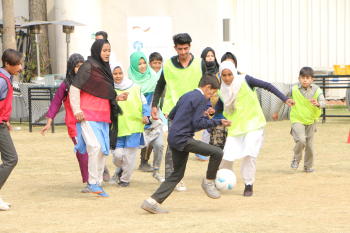
Sport for Development Initiative in Pakistan
With over 60% of its population under the age of 30, Pakistan has one of the youngest demographics in the world. This youth majority, however, continues to face long-standing challenges. Many lack sufficient access to quality education, professional training, and essential life skills, which limits their opportunities for social and economic mobility.
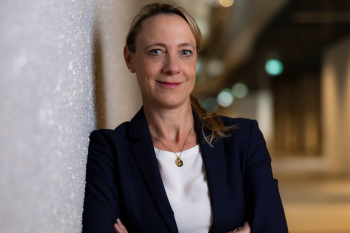
This Partnership Is a Testament to the Power of Football Beyond the Pitch
The DFB’s work with GIZ highlights football’s potential as a driver of social change. In this interview, Christina Gassner reflects on the Future Leaders in Football programme, how young women are shaping their communities, and the opportunities to expand the partnership’s global reach and lasting impact.
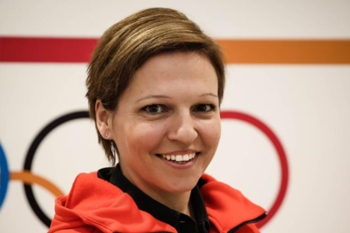
Cross-Sectoral Collaboration Is Key to Strengthen S4D
Sport for Development has been a cornerstone of the DOSB’s international strategy for more than 15 years, reflecting the values of cooperation and solidarity in the Olympic Movement. In this interview, Katrin Grafarend highlights key learnings from past projects and outlines how cross-sector collaboration can keep sport a driver for social development despite global challenges.
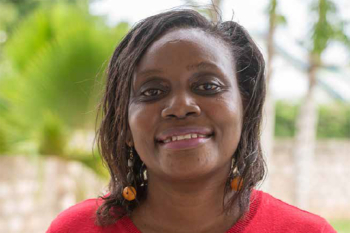
We Gave the Girls a Football of Their Own and That Flipped the Script
Moving the Goalposts has spent over two decades using football to empower girls and transform communities in coastal Kenya. In this interview, Dorcas Amakobe and Deogratia Okoko share how community-led approaches, male engagement, and the Equal Play Effect network are helping girls claim space, challenge norms, and step into leadership roles on and off the pitch.
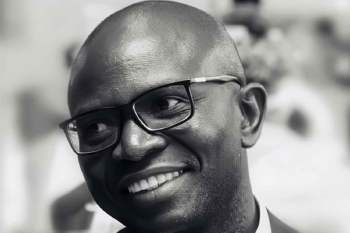
Africa Is the True Home of Sport for Development
The African Union Sports Council is driving the integration of sport into continental development agendas. In this interview, Dr. Decius Chipande reflects on the AUSC’s mission, its partnership with S4DA, and how embedding sport into government systems can promote gender equality, youth leadership, and sustainable social transformation across Africa.
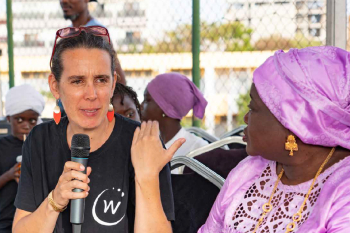
Menstrual Health Education – Step by Step and Through Empowering Language
API Afrique is a Senegal-based social enterprise producing eco-friendly menstrual and baby care products while addressing taboos around menstruation and gender. In this interview, co-founder Marina Gning explains how combining local production, health education, and advocacy is empowering women and girls, shifting attitudes, and driving social change across West Africa.
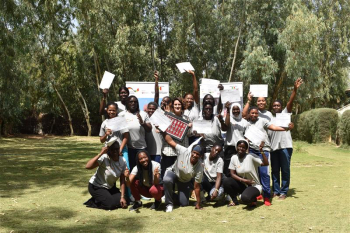
Breaking Barriers: African Women in Sport Lead the Charge for Change
This International Women’s Day, we celebrate the unwavering spirit of African women who are reshaping the landscape of sports and social change. In Saly, Senegal, from February 10-14, a group of remarkable women gathered, not just as participants in a workshop but as architects of a movement.
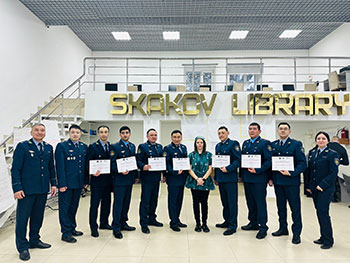
Kostanay Police Academy Pulls Out the Big Guns - Sport for Development Against Violent Extremism in Kazakhstan
By Samia Khatib & Luise Haunit
As part of the GIZ PREVECA project, trainer Samia Khatib conducted a four-day Sport for Development (S4D) training at the Kostanay Police Academy in Kazakhstan from March 17 to 20. At first, the atmosphere was skeptical.
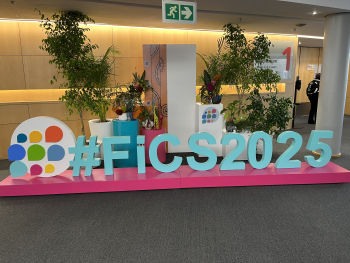
When Sport for Development meets the Finance Sector
By Tom Levin
Sport for Development is on the rise – this is at least the impression you get listening to various actors from the sports and development finance sector. From February 26 – 28, more than 530 public development banks accounting for $23 trillion in assets (10-12 % of annual investments globally) met in Cape Town for the 2025....
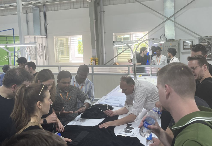
From Field to Fan Shop
In January 2025, a delegation from the From Field to Fan Shop initiative traveled to India to assess the project’s progress and kick off its second phase. More than 30 representatives from Bundesliga clubs such as Hamburger Sportverein, Eintracht Frankfurt, Union Berlin, and St. Pauli, BRANDS Fashion, Fairtrade Germany...
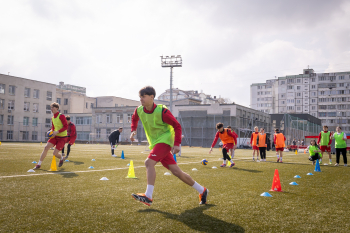
Harnessing the Power of Sport for Development in Moldova
Sport has the power to create meaningful social change, and Moldova has recently embraced this potential through a one-year Sport for Development (S4D) initiative. This innovative project, commissioned by the German Federal Ministry for Economic Cooperation and Development (BMZ) and implemented by GIZ Moldova, aims to equip young people with essential life skills through sport.
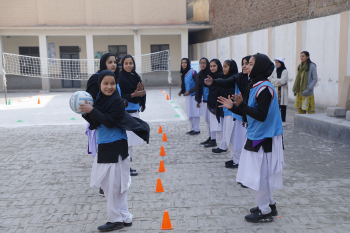
Real-life Experience in Promoting Gender Equality in Pakistan
At the beginning of this year, we had the pleasure of hosting the adidas Foundation in Pakistan! During their visit, they met with the Minister for Elementary & Secondary Education in Khyber Pakhtunkhwa and engaged with students in four government schools, including two dedicated girls' schools, to experience our Sport for Gender Equality sessions firsthand.
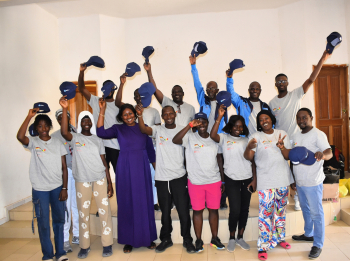
Empowering Communities Through Inclusive and Gender-Sensitive Sports Infrastructure
Sports have the power to bring people together, but to truly create lasting impact, the spaces where they take place must be accessible, safe, and inclusive. Recognizing this, the GIZ Regional Sport for Development Project in Africa partnered with the OlympAfrica Foundation (OAF) to host a transformative two-day workshop in Gandiaye, Kaolack, Senegal, from March 14–15, 2025. The goal?
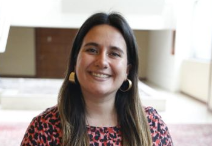
We Don't All Have to Be Athletes to Be Great Women in Sports
For many women, growing up without female sporting role models was the norm. In Chile, like in many countries in Latin America, this gap has been especially persistent. A 2018 UN Women survey found that many girls looked up to male footballers, while physical education reinforced gender divides—keeping girls away from traditionally male-dominated sports.
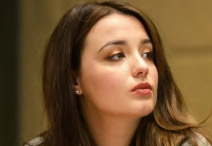
Sport for Development is a valuable tool for promoting intercultural dialogue and reconciliation in the Western Balkans
Could you give me an insight into your work?
As a Programme Officer at RYCO in Skopje, I mainly work with young people and regional cooperation projects that aim to address reconciliation, intercultural dialogue, peace-building and participation here in the Western Balkans.
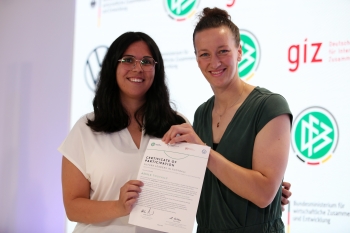
Interview with Almuth Schult: “Sport is a powerful tool for promoting equal opportunities for women and girls”
Almuth Schult, a world-class goalkeeper and former German national team player, has seen football’s transformative power both on and off the pitch. In this interview, she shares how sport has shaped her as a person and empowered women and girls around the world. As a guest at the most recent Future Leaders in Football Camp, Schult witnessed firsthand how programs like this inspire young women to become leaders in sports and advocates for gender equality in their communities.
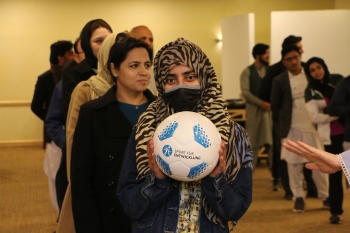
From being shy to being unstoppable: How sport transformed Hira into a leader of change in Pakistan
In a country where opportunities for women are often overshadowed by societal constraints and gender inequality, Hira’s story is a powerful one. Coming from a vulnerable and conservative community in Pakistan, a nation ranked 142 out of 146 in the Global Gender Gap Report 2023, Hira dared to dream differently – and succeeded.
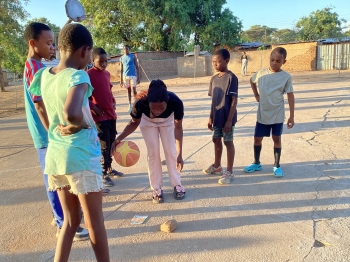
Bouncing back: how one refugee is transforming lives through basketball
"For me, basketball is more than just a game – it's a way to uplift my community," .
Meet Mapendo Sadiki—a young refugee from the Democratic Republic of Congo who is breaking barriers and building dreams on the basketball court in Zimbabwe.
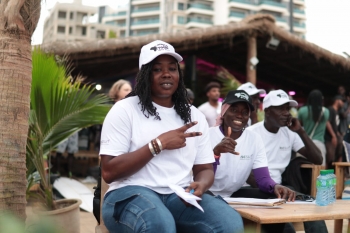
Surf to rise
For years, women in Africa have faced gender stereotypes and discrimination, especially in the world of surfing. Today, through its Africa Surf Tour programme, the African Surfing Confederation (ASC) is breaking barriers by advancing Sustainable Development Goals such as Gender Equality, Conservation, and Inclusion in Surfing.

Strengthening regional ties: S4D workshop connects Tunisia, Morocco, and Senegal
Last autumn, S4D coaches and instructors from Tunisia, Morocco, and Senegal came together in Tunis for the very first time to share best practices, discuss common challenges, and explore ways to collaborate regionally in the future.
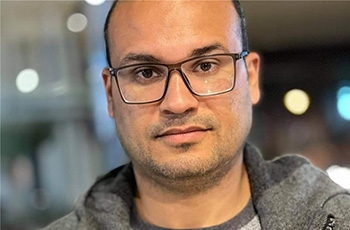
Interview with Tarek Rekik, head of the cultural and sports activities department at the Tunisian Vocational Training Agency
How can Sport for Development (S4D) transform the futures of young people in Tunisia? In an inspiring interview, Mr. Tarek Rekik, head of cultural and sports activities department at the Tunisian Vocational Training Agency (ATFP), reveals how S4D is equipping youth with critical soft skills, fostering social inclusion, and opening doors to career opportunities.
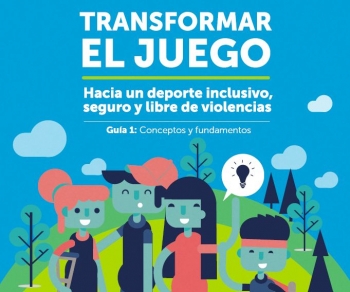
Commemorating November 25th: South America Joins Efforts to Prevent Gender-Based Violence Through Sports
An important step in the fight against gender-based violence (GBV) was taken at a meeting of the South American Sports Council (CONSUDE) in Colombia in commemoration of 25 November, 2024 - the International Day for the Elimination of Violence Against Women. In the midst of discussions that saw Chile re-elected as the Council's president, an innovative new tool was launched that aims to use school sport to meaningfully address GBV.
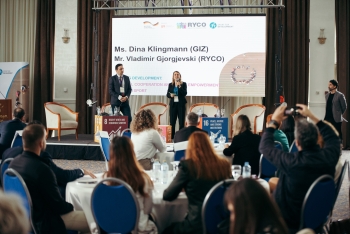
Regional cooperation and youth empowerment through sport in the Western Balkans
On October 29 and 30, 2024, GIZ’s Sport for Development in the Western Balkans, together with the Regional Youth Cooperation Office (RYCO), invited participants to a conference on “Regional Cooperation and Youth Empowerment through Sport” in Skopje, North Macedonia.
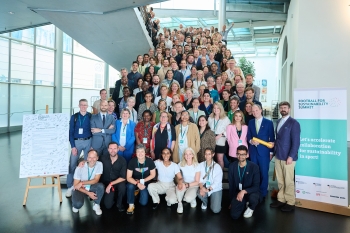
S4D co-organizes the "Football for Sustainability Summit" in Berlin
The German government, (international) organizations, companies, athletes and activists pledged to foster collaboration for more sustainability in and through sport at the “Football for Sustainability Summit” in Berlin in from 11-12 July 2024. How can sport contribute to sustainable development around the world? This overarching question lead the participants through the two days of the summit.
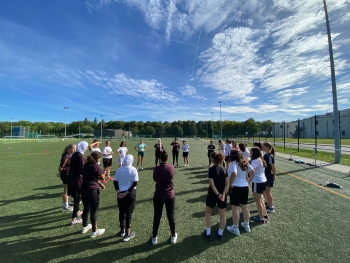
Future Leaders in Football Camp 2024
The 5th edition of the "Future Leaders in Football Camp" invited 18 inspiring young women from 15 countries around the globe to Berlin this July. Over the course of the camp, participants had the unique opportunity to engage with distinguished speakers from the world of sports, management, public relations, and beyond. Together, they explored the challenges of emerging as female leaders in the traditionally male-dominated spheres of sports and football.

Analysis of sport industry shows success in partner countries
The sport industry enjoys a pedigree of different sectors which contribute to overall economic landscape of a country. In this regard, further development and research into such topics is needed, especially in the field of Sport for Development (S4D). To understand this phenomenon in depth, a comprehensive study was undertaken by the German Sport University in collaboration with Deutsche Gesellschaft für Internationale Zusammenarbeit (GIZ) about the impact of the sport industry in partner countries. The methodology of the study included an analysis of the sport sector’s relevance, and its impact on certain economic elements, such as employment, GDP, and economic growth.

Association Magg’ando is the winner of the « Women in Sport Entrepreneurship » contest.
On Friday 9 June, the final panel of judges for the "Women in Sport Entrepreneurship" competition, set up by Sport Impact and GIZ-S4DA, met in Dakar. After a pre-selection phase in May, during which several applications were received from African women entrepreneurs in the sports sector in Senegal, three nominees were given the opportunity to present their project orally to a panel of judges in the hope of winning a financial grant of €15,000.

Launch of "From Field to Fanshop" sustainability initiative
The "From Field to Fanshop" initiative, which was launched by the German Federal Ministry for Economic Cooperation and Development (BMZ) together with the textile company Brands Fashion, travelled to India for a kick-off visit to the project region. The initiative includes nine soccer clubs from the 1st

16 Days of Activism: Can Sport for Development fix it (all)?
Think about all the women and girls in your life. Read these figures again. Let that sink in…
The COVID pandemic has exasperated violence against women, especially younger women aged 18-49. Women in rural areas, mothers, and unemployed women are most impacted by the pandemic compared to other women. This is why having an intersectional lens is essential. Women are not all the same.

Launch of “Guideline Sport for Development and Human Rights”
We are thrilled to launch the “Guideline Sport for Development and Human Rights” as a resource for all practitioners, researchers and interested individuals in “Sport for Development” (S4D). Human Rights have received increasing attention in the context of sport over the past years

African Union Sport Council Survey on women and girls in sport, physical education, and physical activity
The African Union Sports Council (AUSC), the specialized technical office of the African Union (AU) responsible for sport, is conducting a survey to map governmental and non-governmental organizations, networks, and programs focused on promoting the empowerment of girls and women through sport, physical education and physical activity in Africa. Participation in the survey is open to those over the age of 18, who are actively engaged in the aforementioned areas.

Sport for Mental Health and Social Cohesion programme sees success over six months
Last week marked the end of the Sport for Mental Health and Social Cohesion project, the result of a unique collaborative effort by FIFA, the Agence Française de Développement (AFD) and the Deutsche Gesellschaft für Internationale Zusammenarbeit (GIZ), work on behalf of the Federal Ministry for Economic Cooperation and Development (BMZ).

Panel Discussion on the Future of Academia in Sport for Development
As part of the longstanding cooperation with Deutsche Gesellschaft für Internationale Zusammenarbeit (GIZ), the German Sport University (GSU) has been investigating the current status of academic work and cooperation in the field of Sport for Development.

From Football to Gymnastics: Gender Inequality is Everywhere - Female Changemakers in S4D
We are celebrating International Women's Day on 8 March by giving our female changemakers a stage during our Gender Week. The fight against gender inequality is everyone's business - and all together can achieve equal opportunities. We start with Mariam and Veronique, who tell us how they fought the sporting bias.

"SPORT FOR MENTAL HEALTH AND SOCIAL COHESION" (SMHSC) PROGRAMME: Final recipients selected
The Agence française de développement (AFD), the Federation Internationale de Football Association (FIFA) and the German Development Cooperation (BMZ/GIZ) have joined forces to finance the "Sport for Mental Health and Social Cohesion" (SMHSC) programme in response to the Covid pandemic. A total of 13 projects were selected for support. The contribution of FIFA valued football-based projects.
13 projects selected for "Sport for Mental Health and Social Cohesion" (SMHSC) programme
The Agence française de développement (AFD), the Federation Internationale de Football Association (FIFA) and the German Development Cooperation (BMZ/GIZ) have joined forces to finance the "Sport for Mental Health and Social Cohesion" (SMHSC) programme in response to the Covid pandemic. A total of 13 projects were selected for support. The contribution of FIFA valued football-based projects.

Olympic Refuge Foundation scales up programme in Uganda thanks to partnership with German Development Cooperation
Thanks to the partnership with German development cooperation, the Olympic Refuge Foundation can extend its programme in Uganda to the Kyangwali refugee settlement. The aim is to strengthen the mental health and well-being of young refugees through "Sport for Protection" activities to mitigate the effects of the Covid 19 pandemic.

16 Days of Activism against Gender-Based Violence Orange the World: End violence against women now
According to UN Women, one in three women worldwide experience physical or sexual violence, and only 40 percent seek help of any sort afterwards. The annual international campaign “16 Days of Activism against Gender-Based Violence”

How Sport Can Promote Sustainable Development - Finance in Common Summit 2021
The Finance in Common Summit 2021 took place from 19 to 20 October. After the launch of the Coalition Sustainable Development through Sport last year, this time the focus was on the question "What contribution can sport make to sustainable development?" Axel Klaphake (Director Economic and Social Development, GIZ) took part in the panel discussion.

FIFA to support launch of Sport for Mental Health and Social Cohesion programme
In response to the COVID-19 pandemic, the Agence Française de Développement (AFD), the Federation Internationale de Football Association (FIFA) and the Deutsche Gesellschaft für Internationale Zusammenarbeit (GIZ) are launching the Sport for Mental Health and Social Cohesion (SMHSC) programme.

Launch of the Sport for Mental Health and Social Cohesion Programme (SMHSC) Co-funded by AFD, FIFA and GIZ
In response to the COVID-19 pandemic, the Agence Française de Développement (AFD), the Federation Internationale de Football Association (FIFA) and the Deutsche Gesellschaft für Internationale Zusammenarbeit (GIZ) are launching the Sport for Mental Health and Social Cohesion (SMHSC) programme.

Sport for Development (S4D) Youth Leaders – Giving Back to the Community
The GIZ S4D - Jordan Youth Leadership Programme empowers motivated young people of diverse backgrounds to initiate sport and play activities for fellow youth and children within their communities. The aim is to increase civic engagement of youth in ‘Sport for Development’ to promote social change in targeted communities. Over the last three years, 37 youth leaders from six different areas in Jordan have joined the programme and have acquired the necessary knowledge and skills to deal with kids and youth following the safeguarding policy and to develop and implement activity plans that meet local needs.

‘How sport promotes development’ – Workshop discussion at the Federal Ministry for Economic Cooperation and Development
The ‘Werkstattgespräch’ (workshop discussion) took place in virtual format on the evening of 6 June 2021. Workshop discussions are a fixed event format of the Federal Ministry for Economic Cooperation and Development (BMZ). The aim of the series of events is an open exchange on changing topics in order to create space for input, discussion and suggestions for the further development of the topic area – this time under the headline of ‘Daring more sustainability - How sport promotes development’.

Citius, altius, fortius – communis: Using ‘Sport for Development’ to achieve social cohesion
In a joint virtual event, GIZ and DOSB highlighted the role of sport in development cooperation with a special focus on social cohesion. The Covid-19 pandemic has clearly demonstrated how the lack of educational opportunities, violent conflicts and lack of health care especially affects the situation of children and youth around the world. It is precisely in this situation that innovative approaches to solving societal challenges are needed. In this context, sport, with its inspiring power, has a special role to play: it creates better future prospects for children and young people and strengthens social cohesion.

Future Leaders in Football work towards socially responsible leadership
It was kick-off time for 22 Future Leaders in Football on Monday, 7th June starting the 5-day virtual leadership course as part of GIZ’s Sport for Development activites. In the context of the EURO 2020 to be held from 11th June – 11th July 2021 in 12 of Europe’s most iconic places the idea was to bring together the Future Leaders in Football and develop together the tools and knowledge to become changemakers in their organisations and communities.

New Guidelines available!
Reflection makes the difference between a Sport for Development (S4D) session and a regular sport session. Without reflection, there will be neither a connection nor a transfer of competences to daily life situations and, therefore, there will be no impact. The Reflection Guideline for S4D Training Sessions helps you to understand the importance of reflection for competence and life skill development as well as for recollecting of what was learned during the session.

Western Balkans: Course Outline published in four languages to support S4D instructors
Approaching the end of the turbulent year 2020 the S4D team on Social Inclusion through Sport in the Western Balkan Region is proud to publish the jointly developed Course Outline for a basic level Training of Trainers. It is aimed to support the S4D instructors to pass on the basic principles of S4D and better structure their trainings for teachers, sport coaches and social workers...

GIZ joins Public Development Banks and international sport organisations in Sport for Development Coalition
On 11 November 2020, GIZ participated in a special session entitled “Mobilisation of Development Finance for Sustainable Sport” and joined the Sport for Development Coalition. This is an initiative spearheaded by the Agence Française de Développent (AFD)
